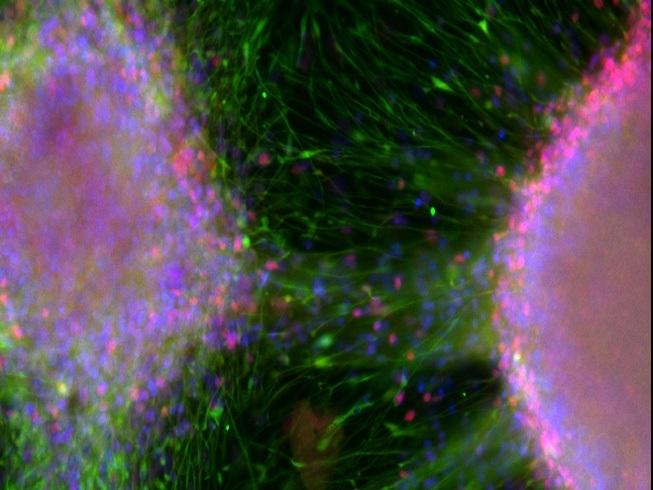We caught up with our newest Group Leader, Dr Kat Bowles (UK DRI at Edinburgh) ahead of International Day of Women and Girls in Science, to find out more about her passion for her research, the stresses involved with setting up a new lab, and how the unwavering support of other women has lifted her up throughout her career.
“I fell in love with anything and everything to do with tau, I don’t understand why anyone researches anything else, because it’s the most interesting protein ever!” Dr Bowles says.
Misfolded tau is one of the main hallmarks of Alzheimer’s disease. The protein normally helps provide structural support to nerve cells in the brain – acting as a type of scaffolding. In Alzheimer’s, it becomes misfolded and accumulates in clumps, or tangles, and is implicated strongly with the symptoms of cognitive decline that are associated with the disease.
Before joining the UK DRI, Dr Bowles worked in Prof Alison Goate’s lab at the Icahn School of Medicine at Mount Sinai, New York City, where she moved after her PhD.
“Initially I only intended to stay in New York for two years,” she explains, “but I ended up staying there for seven years altogether. I learnt everything I do now in Alison’s lab: it’s where I first got exposure to iPSC modelling, genetics, and where I started working on tau.”
Dr Kat Bowles joined the UK DRI at Edinburgh as a Group Leader
If you say tau pathology, that could mean a million different things. I really enjoy the puzzle. There is so much that we don’t understand, and that makes it so interesting to study.Dr Kat BowlesGroup Leader at the UK DRI at Edinburgh
It was there that Dr Bowles first became hooked on solving the puzzle of tau.
“Tau is associated with many different diseases, accumulating in different ways, cell types, and structures, and we have no idea why that happens! If you say tau pathology, that could mean a million different things," she explains. "I really enjoy the puzzle. There is so much that we don’t understand, and that makes it so interesting to study.”
“In my lab, we’ll be using iPSC models to try and understand the very earliest mechanisms that are changing in the diseases that involve tau. Using 3D models, we want to try and understand what’s happening in the cell due to the presence of a mutation in the tau gene.”
In the US, many research institutes have a stipulation that you can’t be a postdoc for more than 5 years because it inhibits your career progression. So, after 5 years in New York, Dr Bowles was promoted to the role of ‘instructor’, a kind of pre-faculty role that enables you to apply for more grants and run independent projects. In 2021, she landed the terrific achievement of a first-author paper in Cell, and in August 2022, made the leap back from the US to start her own lab at the UK DRI at Edinburgh.
“It’s been a real learning curve,” she reflects. “There are completely different skills involved when you have your own lab. I’ve been doing lots of admin, laying groundwork, waiting for brain tissue to be shipped from New York… I’m really keen to do some science now!”

neurons in culture
As a young, female Group Leader, Dr Bowles is no stranger to the challenges women face in academia.
“The main thing that’s contributed to my negative experience is the attitudes and microaggressions, small things that make your day-to-day experience different to that of your male colleagues,” Dr Bowles explains.
“Recently, I had an experience where my expertise was disregarded by an older man in a meeting. These things add up and undermine you. Older generations can’t believe that a younger, female colleague could know more than them about something.”
But, she says, one thing she counts herself lucky for is the unwavering support of other women throughout her career.
“Both my PhD and postdoc supervisors were women,” she says. “Both amazing scientists, they did everything they could to support my career and provide opportunities for me that I wouldn’t have gotten independently. I also have a whole network of women I met during my postdoc, who are always making sure I’m invited to give a talk at their institute or pushing me forward to be a co-applicant on a grant. These are little things but they’re so important for career progression, and making you feel valued and confident in your expertise.”
Whilst she’s currently still waiting for the rest of her team to start, Dr Bowles is excited to hit the ground running with her new research programme at the UK DRI.
“My team will be working on anything and everything tau,” she says, “in a kind of disease agnostic way, with projects in Alzheimer’s, frontotemporal dementia, progressive supranuclear palsy, Parkinson’s… We’ll be attacking this with iPSC models, generating a tonne of organoids, trying to understand the mechanisms involved in tauopathies.
“In one big project, we’ll be looking at hyperexcitability of neurons and how that might be leading to cell death in frontotemporal dementia. Hyperexcitability is associated with increased expression of glutamate receptors in cells, and we’ll be digging into the mechanisms involved, to see if we can intervene and prevent the cells from dying. But I don’t feel like I really have my own lab until I have people in it, so I’m looking forward to getting going when my team have joined!”
We can’t wait for Dr Bowles and her team to get started!
To find out more about Dr Kathryn Bowles’ work, visit her UK DRI profile. To stay up to date on the latest research news and institute updates, sign up to receive our monthly newsletter, ‘Inside Eye on UK DRI’.
Article published: 10 February 2023
Image credits: Dr Kathryn Bowles
